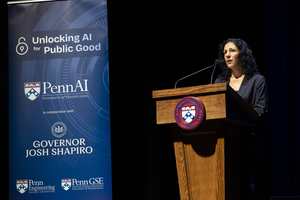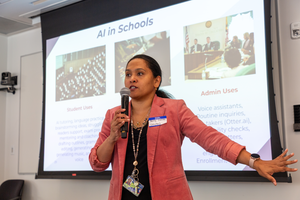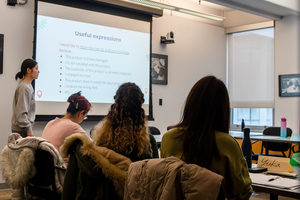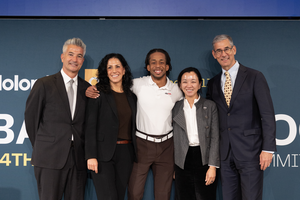Several Penn GSE faculty members have received prestigious awards for their groundbreaking research and leadership in their fields. The honors include three Spencer Foundation grants to fund studies on the impact of a Montessori-inspired early education program for girls in Nigeria, another on how student data shapes family educational experiences and influences school stakeholders, and a third project investigating how state policies transform K-12 teacher roles.
These accolades align with Penn GSE’s strategic vision, Together for Good, and the school’s commitment to advancing professional training and educational leadership, strengthening education’s role in a democratic society, deepening community partnerships, and fostering innovation.
This year’s early recognitions include:
Maria Cioè-Peña, Assistant Professor
Maria Cioè-Peña, a bilingual/bi-literate researcher and educator, received an award—Research Improving the Educational Access, Experiences, and Outcomes of BIPOC Students with Disabilities—from the Council for Exceptional Children Division for Research, the largest international special education professional organization.
Cioè-Peña’s work examines the intersections of disability, language, school-parent partnerships, and education policy. The award recognizes contributions to understanding and enhancing educational access, experiences, and outcomes for BIPOC students.
L. Michael Golden, Vice Dean of Innovative Programs and Partnerships and Senior Fellow
L. Michael Golden received a Merit Award from the Pennsylvania Educational Technology Expo and Conference (PETE&C) for his leadership in educational technology and research contributions.
Golden founded and leads Catalyst @ Penn GSE, which designs innovative practices and scalable solutions to expand learning opportunities.
Pam Grossman, Professor of Education, and Maya Kaul, Postdoctoral Fellow
Pam Grossman, a professor of education and former Penn GSE dean, and Maya Kaul, a Penn GSE alum and postdoctoral fellow, have been awarded a highly regarded Spencer Foundation grant for their project, “Chutes or Ladders: Surveying State Policy Approaches to Transforming K-12 Teacher Roles.”
The study investigates how state policies influence the transformation of K-12 teacher roles.
Grossman is an expert on teacher education, teacher knowledge, professional education, and teaching English in secondary schools. Kaul is a postdoctoral fellow at Penn GSE.
The American Association of Colleges for Teacher Education also awarded Kaul with its 2025 AACTE James D. Anderson Outstanding Dissertation Award for her doctoral research, “The Making of a Professional: Institutional Logics of Teacher Education and Teacher Professional Identity Formation.” The award, in honor of highly respected educational leader James D. Anderson, recognizes excellence in doctoral research that enhances educator preparation or teaching and learning.
In her dissertation, Kaul investigates how teacher education reforms aim to transform professional education and how these frameworks will impact teacher education programs and educators’ professional identities. She accepted the award at the AACTE’s 2025 Annual Meeting in February in Long Beach, California.
Kaul has also been honored by the American Educational Research Association (AERA) with an Outstanding Dissertation Award, Division L for Educational Policy & Politics. She will receive the award on April 24.
Yasmin B. Kafai, Lori and Michael Milken President’s Distinguished Professor
Yasmin B. Kafai has been selected for a 2025 Stibitz-Wilson Award from the American Computer and Robotics Museum for her participation in developing, with MIT colleagues, the Scratch programming community used by over 100 million children worldwide.
Kafai develops tools, projects, and communities that foster coding, critical thinking, and creativity. Her current research explores algorithm auditing in machine learning applications. Additionally, through the nationwide Exploring Computer Science curriculum, she launched the use of electronic textiles to introduce computing, engineering, and machine learning in high school classrooms.
She will receive this award in person in September in Bozeman, Montana.
Sarah Schneider Kavanagh, Associate Professor
Sarah Schneider Kavanagh was recently awarded a prestigious Spencer Foundation grant titled “Collaborating Towards Transformational Visions for Digital School Systems.” Kavanagh’s research focuses on the impact of growing student data sets, including how educational stakeholders apply the data and its effect on families' relationships with the school.
The three-year project will begin with interviews with educators, administrators, and focus groups of students and families. Then, the research team will create working groups to develop alternative data collection, usage, and application norms.
Trey Smith, Adjunct Instructor
Trey Smith, a science methods instructor for the Penn GSE’s Independent School Teaching Residency (ISTR) program, was honored by former President Joe Biden with the Presidential Award for Excellence in Mathematics and Science Teaching (PAEMST).
The distinction is the nation’s highest award for science and math teachers and mentors. A veteran educator, Smith has taught biology, chemistry, computer science, physical science, and social studies in Philadelphia public schools and has received multiple teaching awards. He is also a teacher consultant for the Philadelphia Writing Project (PhilWP) at Penn GSE.
Sharon Wolf, Associate Professor
Sharon Wolf has been awarded a distinguished Spencer Foundation grant to fund her research on a Montessori-based early education program for girls from vulnerable families in rural northern Nigeria. The project, “Assessing Medium-term Impacts of Montessori-Preschool Spaces in Rural Northern Nigeria,” is a research-practice partnership with the Centre for Girls.
The work expands on a previous study that determined the program significantly impacted the students’ development and learning. The Spencer Foundation grant will help advance the second related study examining the midterm outcomes in primary school, including enrollment, academic and non-academic outcomes, and family responses.
“We recently published the first paper from this work, and the grant will allow us to continue to follow the girls from the study over the next two years,” said Wolf, an expert on childhood development and educational outcomes.
Media Inquiries
Penn GSE Communications is here to help reporters connect with the education experts they need.









